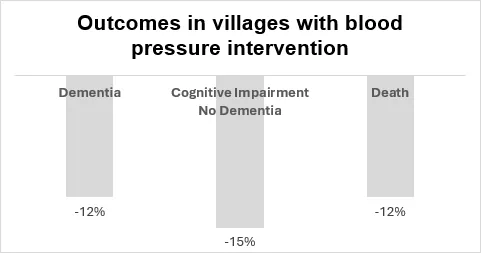Summary: Better blood pressure was achievable and led to lower rates of dementia and death in a short time period.
Source: He, et al Nature, April 21, 2025. Note that residents of intervention villages had higher rates of low blood pressure, fainting, and falling, although these did not reach statistical significance.
Researchers in China demonstrated that a community health worker intervention to treat high blood pressure substantially reduced hypertension, dementia and death. In just four years, those over 40 who lived in villages that were randomized to get this intervention had statistically significantly lower blood pressure and lower rates of dementia, cognitive impairment without dementia, and death compared to residents of villages that received usual care. This research report was published in Nature.
Source: He, et al Nature, April 21, 2025
Among the about 34,000 people in this study, rates of dementia were decreased by 12%, rates of cognitive impairment without dementia decreased by 15% and rates of death declined by 12%. Rates of reported adverse effects were higher in those who lived in the usual care villages. The values reported here were after statistical adjustment to make the populations equivalent. Those in the treated villages on average took three medications, while those in control villages (usual care) were on 1.2 medications.
Implications for employers:
This study demonstrates that it’s possible to control blood pressure, even in a low-resource community, and even without many physicians.
Those whose blood pressure was better controlled had lower incidence of dementia or other cognitive impairment, and were less likely to die.
Hypertension is not under control in the majority of those in the U.S. with hypertension in every age category, as I noted in a post last month.
A diet that is low in salt (sodium) and includes more unprocessed food and regular exercise can help lower blood pressure, but many with high blood pressure (including me!) require medications to avoid excess risk of cardiovascular disease. Employers can offer healthy food at company cafeterias and make it easy for employees to exercise close to the workplace.
Employers can ask their carriers to report on blood pressure control in their populations. This is a standard measure of the National Committee for Quality Assurance (NCQA), but carriers often fail to report this metric because it requires chart review or electronic health record analysis.
Thanks for reading. You can find previous posts in the Employer Coverage archive
Please subscribe, “like” share this newsletter with friends and colleagues. Thanks!
Tuesday: Vaccine misinformation on the rise




